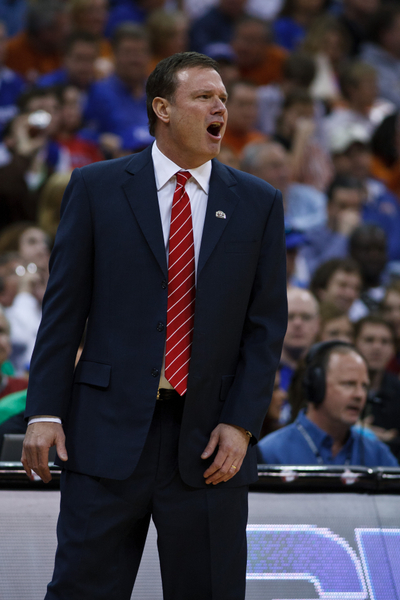Dissecting Bill Self’s Point Guard Problems at Kansas
Posted by KoryCarpenter on December 7th, 2012It isn’t natural watching a Bill Self team struggle at the point guard position, but that’s exactly what’s happening this season. It doesn’t help that Kansas has had great point guard play for most of Self’s nine seasons at the helm, raising expectations and magnifying mistakes for whomever is running the Kansas offense. Sophomore point guard Naadir Tharpe looked to be the replacement this year for four-year starter Tyshawn Taylor, but that hasn’t been the case. Tharpe, who watched most of last season from the bench, is averaging 4.0 PPG and 2.1 APG in 16 MPG, pushing the responsibility of running the team to senior guard Elijah Johnson. The problem is, though, that Johnson has played off the ball during his three years at Kansas. He hasn’t adapted to the position change yet, and it has hurt the Jayhawks offense. “It’s not Elijah,” Self said on Thursday. “as much as it is the pieces around Elijah.”
With Tharpe not taking the step up that people may have expected and freshman guard Rio Adams still adjusting to the college game, the Jayhawks are in unfamiliar territory. Self even practiced with senior forward Kevin Young at the point earlier this week, although he said it only lasted about 10 minutes. The problems this season can be traced all the way back to the 2011 recruiting class. Self landed five-star point guard Josh Selby, a huge get at the time. But Selby barely had time to unpack his bags before he declared for the NBA Draft. Self’s other commitment that year was Royce Woolridge, a three-star guard who later transferred to Washington State. A year later, Self offered scholarships to a number of guards, eventually landing Ben McLemore — a prototypical two or three guard — and Tharpe. In last year’s class, Self went after several potential point guards, from Marcus Smart and Marcus Paige to Archie Goodwin and Gabe York, eventually receiving a commitment from Rio Adams.
It should be noted that in Self’s offense, the guards are usually interchangeable. There is rarely a significant distinction between the one, two, and three positions. What’s the problem then, you ask? Well, as Self puts it, “when the offense breaks down, you have to go make plays.” That was never a problem for the teams with Russell Robinson and Brandon Rush or Sherron Collins and Tyshawn Taylor. And it wasn’t supposed to be a problem with Elijah Johnson this season. “It wasn’t really that Elijah’s a lot different than year’s past,” Self said. “We just don’t have anybody else yet to complement him the way we’ve played in the past.” Self said Johnson isn’t as aggressive as he should be offensively because he’s been trying to get everyone else involved. And when that doesn’t work, he isn’t penetrating at the end of the shot clock as easily as a Taylor or Collins. Self said that his offenses are designed to give the defense a chance to break down, but great defenses can guard a team’s sets for the full 35 seconds of the shot clock.
When that happens, “It’s time for players to go make some plays.” That’s what hasn’t been happening for the Jayhawks like it has in the past, and that’s why Self has been looking for point guards both last year and for next season. He signed three-star guard Frank Mason and four-star guard Conner Frankamp for the future, although Frankamp might play off the ball more in college. Self has been recruiting more guards to fill out his No. 2 recruiting class for 2013, guys like Demetrius Jackson, Anthony Barber, and Chris Jones, although those players all committed elsewhere. Naadir Tharpe doesn’t look like a viable option for Self at the point either. He believes Johnson will eventually learn to distribute the ball like a point guard without losing the scoring mentality he featured in last season’s NCAA Tournament. Whether that happens or not might ultimately decide how far this year’s version of the Jayhawks advance in March.










































